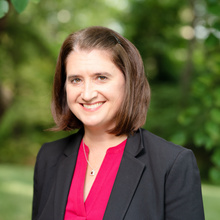A new research center focused on collaborative research and community engagement in climate adaptation planning will give faculty and students at the College of Law an opportunity to see how laws and policies affect real-world activities surrounding land use, conservation efforts, and other environmental endeavors.
The five-year, $6 million project, funded by the U.S. Department of Commerce and the National Oceanic and Atmospheric Administration (NOAA), aims to enhance climate resilience efforts in the Central Midwest region. The project will establish a 13th regional team within NOAA’s Climate Adaptation Partnerships (CAP)/Regional Integrated Sciences and Assessments (RISA) network, covering Iowa, Missouri, Kansas, and Nebraska.

“There are all kinds of governance issues – local, state, and federal, different agencies and different stakeholders who regulate land use and activity on the land,” says Shannon Roesler, the Charlotte and Frederick Hubbell Professor of Environmental and Natural Resources Law and faculty director of the Hubbell Environmental Law Initiative (HELI), who serves as a co-principal investigator for the new research center. “It will be a very meaningful experience to see the law in action, and it’s the kind of research students can do: to learn whether what you think is happening based on the laws and policies is really what’s happening on the ground.”
The new research center will be housed at the University of Iowa College of Public Health and led by Brandi Janssen, clinical associate professor of occupational and environmental health, and will include institutional partners such as the Hubbell Environmental Law Initiative (HELI), the University of Iowa’s IIHR—Hydroscience and Engineering, the Nebraska Indian Community College, Iowa State University, University of Nebraska-Lincoln, and Princeton University. These institutions will collaborate to provide technical assistance to communities and establish new partnerships in the four-state region.
The project will focus on collaborations with two underrepresented groups in the region: tribal nations and women who own farmland. The team looks to understand how these communities are responding to climate change-induced hazards and develop data collection and decision-making tools to enhance their resilience and will incorporate techniques such as environmental monitoring, vulnerability assessments, and storytelling to gather institutional, historic, and cultural knowledge.
Roesler says the “truly interdisciplinary” aspect of the new research center presents exciting learning opportunities for both students and faculty.
“We have close to 40 experts in different fields; we have engineers, geologists, educators, social scientists,” Roesler says. “It’s really rewarding to work with people with such different perspectives and to ask questions and learn. It’s wonderful to see this model in action for a grant this size.”
Roesler and the HELI students will help community projects with aspects of law and policy, but it will take time before they have specific projects to work on. One of the aims of the research center is to help community groups develop and implement projects, and it will take time to build those relationships and identify areas where Roesler and HELI can help.
“We could get involved early or a little later in the grant cycle,” Roesler says. “It's clear to me that this is a very pressing need, and I’m glad they’re devoting resources to this. Law and policy can be easier to evaluate at a local level.”
About the research center
“We are so excited to be joining the NOAA CAP/RISA Network,” says Janssen. “This funding mechanism is unique in that it allows both researchers and community members to take time to get to know one another so that we can truly be responsive to their needs. Our goal is to put the considerable scientific resources of our academic institutions to work for the region’s tribal nations and women landowners and expand over time to include more community partners.”
The initial group of community partners includes the Santee Sioux Environmental Protection Department; Sac and Fox Environmental Protection Agency; Women, Food and Agriculture Network; and the Center for Rural Affairs.
NOAA's CAP program aims to facilitate collaboration between decision-makers and researchers to address climate risks equitably. This program is funded through five-year cooperative agreements with NOAA and involves research institutions, nonprofit organizations, and government entities in multi-state regions. It's part of a broader initiative to address climate impacts and enhance climate resilience in local communities across the United States.